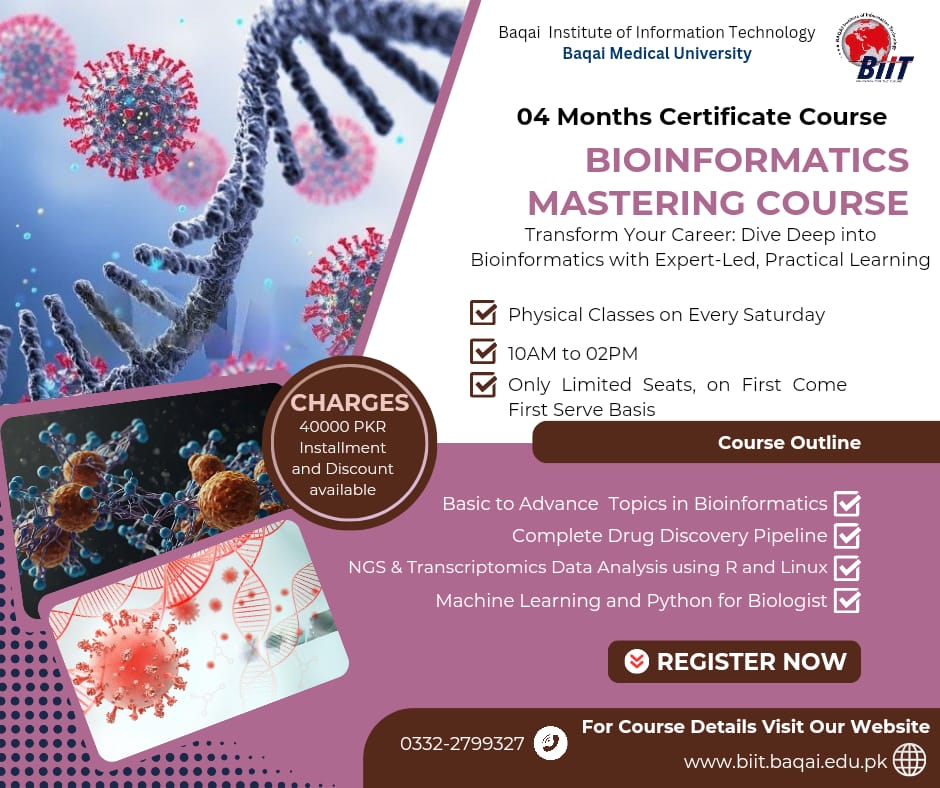
Introduction
Participants will learn to analyze biological data, interpret results, and apply computational techniques in real-world research and clinical settings. The certificate course emphasizes practical application through projects & assignment based learning, enabling professionals to integrate computational biology skills into their careers and contribute to advancements in healthcare, biotechnology, and life sciences.
Career Advancement: Prepares students for careers in bioinformatics, computational biology, and systems biology by covering essential and advanced topics.
Research-Ready Skills: Equips learners with hands-on experience in tools, programming, and techniques crucial for computational biology research.
Interdisciplinary Competence: Bridges biology with computer science, enhancing the ability to work on interdisciplinary projects.
Problem-Solving Abilities: Develops analytical and computational problem-solving skills applicable to real-world biological problems.
Time-Efficient Learning: Weekend-only classes balance professional and academic commitments, making it accessible for working professionals and students.
- Explain the significance of bioinformatics in modern research and healthcare.
- Analyze genetic variations and evolutionary trends using bioinformatics software.
- Analyze next-generation sequencing (NGS) data for genomic insights, including variant detection and annotation.
- Perform differential gene expression analysis and visualize transcriptomic patterns.
- Correlate protein structure with function, enhancing the understanding of bio molecular mechanisms.
- Analyze protein-ligand interactions to predict drug efficacy and specificity.
- Understand basic machine learning concepts and their applications in biological research.
- Perform data manipulation, visualization, and basic bioinformatics computations using Python libraries.
Course Duration = 4 months (16 Weeks)
Class Schedule = Saturdays or Sunday, 4 hours each
Credit Hours = 4
Total Hours = 64 hours
Mode of Classes = Physical (Baqai Institute of Information Technology, Baqai Medical University, Nazimabad 3).
Starting from 18th Jan 2025
Last Date to Apply: 15th Jan 2025
Registration Link:
Course Fees: 40000/ installment available
25% only those who can confirm seats before 06th Jan.
Payment Methods: Easy Paisa on 0332-2799327
|
Week |
Topic to be Covered |
Theory / Lab hours |
Learning outcome |
|
1 |
Introduction to Computational Biology |
1 Theory 3 Labs |
· Understand the scope, applications, and importance of computational biology. · Identify basic tools and resources in computational biology. |
|
2 |
Biological Databases and Data Retrieval |
1 Theory 3 Labs |
• Learn about primary databases (GenBank, PDB, UniProt). • Gain hands-on experience in retrieving data and understanding data formats. |
|
3 |
Sequence Alignment Techniques |
1 Theory 3 Labs |
· Understand sequence alignment types (global, local). · Perform sequence alignment using tools like BLAST and Clustal Omega. · Interpret alignment results in the context of homology and function. |
|
4 |
Phylogenetic and Evolutionary Analysis |
1 Theory 3 Labs |
· Explain evolutionary relationships using phylogenetic trees. · Create and interpret phylogenetic trees using tools like MEGA or PhyML. |
|
5 |
Genomics (NGS) data Analysis with Linux Basis |
2 Theory |
· Understand genomics and NGS technology workflows and analysis. |
|
6 |
6 Lab |
||
|
7 |
Transcriptomic Data Analysis with R Programming |
3 Theory |
· Understand the Basics of R · Perform RNA-Seq data processing, differential expression analysis, and data visualization. |
|
8 |
9 Lab |
||
|
9 |
|||
|
11 |
Protein Structure Prediction and Analysis |
1 Theory 3 Lab |
· Explain basic concepts of protein structure, folding, and stability. · Use tools like AlphaFold or SWISS-MODEL for 3D structure prediction. · Interpret structures using visualization software like PyMOL. |
|
12 |
Molecular Docking and Drug Design |
1 Theory 3 Lab |
· Describe the principles of molecular docking and its applications. · Perform molecular docking using AutoDock or similar software. · Analyze docking results for potential drug discovery applications. |
|
13 |
Machine Learning Applications in Computational Biology |
2 Theory |
· Understand the basics of machine learning and its applications in biology. · Gain practical experience with simple machine learning models for biological data analysis. |
|
14 |
6 Lab |
||
|
15 |
Python for Biologist |
2 Theory |
• Understand the basics concept of Python programing and its global application · Gain hands-on training on biological data with python scripts |
|
16 |
6 Lab |
- Khalida Naveed (Assistant Professor, BIIT)
- Abdul Rafay Khan (Bioinformatician, Senior Research Officer, SIUT)
- Fahad Khan (Bioinformatican, Data Analyst)


